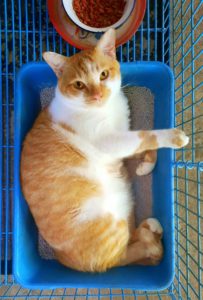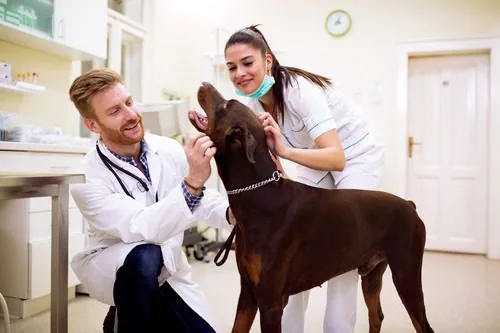Why is My Cat Laying in The Litterbox?
Cats sometimes do the silliest things. Their entertaining antics are what make cat videos so popular on social media. However, sometimes these weird behaviors can be troublesome too. A cat frequently laying in their litterbox can be one of these issues.
Most of the time, cats will lay in their litterbox simply because they are still learning what the litterbox is used for. However, a cat suddenly doing this out of the blue could also potentially be a sign that they are sick, stressed, or in pain.
Here we will be explaining all of the possible causes for a cat to lie in their litterbox. We will also be describing how you can stop your cat from engaging in this problematic behavior. Alright, let’s dig right in!

What Causes Cats to Lay in the Litterbox?
Most of the time a new cat or kitten laying in their litterbox just doesn’t know any better. However, this can also possibly be a sign of stress, sickness, or pain in cats. Some cats will also lay in their litterbox because it feels good or because they are marking their territory. Here are all of the possible reasons why your cat is laying in their litterbox.
Your Cat is Still Learning What the Litterbox Is
If you have a new cat or kitten, then chances are they are lying in their litterbox because they don’t know what it’s used for yet. This is particularly common in very young kittens and cats who have never lived in a traditional home before. Giving your cat some time and making an extra effort to litter train them can help stop this problem.
You Recently Changed to a New Cat Litter
Sometimes, changing your brand of cat litter can lead to your cat laying in the litterbox. This can be either because the new cat litter is very comfortable for your cat to lay in or because the new litter is confusing your cat. Either way, this behavior should stop after a little while.
Your Cat is Not Feeling Well
Cats will sometimes lay in their litterbox when they are not feeling well. Usually, they do this when they are sick or have a medical condition that leads to them needing to use the litterbox more often. If this is the case with your cat then you will likely notice some accidents around the house as well.
Cats may also lay in the litterbox when they are experiencing pain. This is because they do not want to have to walk to the litterbox because it is painful for them. Some other signs of pain in cats include struggling to walk, jump, and climb. Cats experiencing pain may also lie, sit, or stand with an unusual gait.
Your Cat is Feeling Anxious or Stressed
Anxiety or stress can also sometimes cause a cat to lie in their litterbox. Usually, this is because there is competition for this resource, which makes this issue most prevalent in homes with multiple cats. Additionally, some cats may lay in their litterbox because it is the least stressful place for them to relax during stressful times such as moving or having guests.
Your Cat is Marking Their Territory
Cats will sometimes also lay in the litterbox because they are marking their territory. This is most common in intact cats, especially when there are multiple cats in the home. This behavior is also more common in intact male cats than intact females.
How to Stop Your Cat From Laying in the Litterbox 
There are some ways that you can stop your cat from laying in their litterbox. Most cat owners can fix this problem by working on litterbox training and changing their cat litter. However, you may need to see a vet about this issue as well. Here is how you can stop your cat from laying in the litterbox depending on what’s causing the problem.
Work on Litterbox Training
Some young kittens and newly adopted cats just have no idea what the litterbox is. They will sometimes confuse their litterbox for a cat bed as a result. In this case, it is best to work on some extra litterbox training with them. Once you have chosen an appropriately sized normal litterbox, you can begin this process.
The first step to litter training a cat is by introducing them to the litterbox. You can do this by placing them in the litterbox and encouraging them to paw around at the litter. You should do this soon after they have eaten and drank water. Over time, your cat will learn that the litterbox is the place where they can relieve themselves, and they should also stop laying in there.
Change Your Cat Litter
Sometimes cats will lay in their litterbox simply because they enjoy the way that laying in the litterbox feels. If this seems to be the case for your cat then you will likely benefit from changing their cat litter. Usually, the cat will stop laying in the litterbox once the cat litter has changed when this is the root of the problem.
Reduce Your Cat’s Stress or Anxiety
If your cat is laying in their litterbox and exhibiting some other signs of being anxious or stressed out, then working on reducing their stress can help. In some instances, it may also be beneficial to see a vet about chronic anxiety in your cat as well. This is because they may be able to prescribe your cat some anti-anxiety medication.
Get Your Cat Spayed or Neutered
If your cat is exhibiting a lot of behavior that suggests that they are being overly territorial, then getting them spayed or neutered is a good idea. This will most likely stop their territorial behavior and their habit of laying in the litterbox as a result.
Visit the Vet

Of course, the only way to stop a medical problem in cats is by visiting the vet. If you suspect that your cat is laying in their litterbox because they are sick, injured, or suffering from a medical condition then the best thing that you can do is take them to the vet.
Conclusion
Although it can be a normal for cats to lay in the litterbox if they are young kittens or new to the home, it can be a problem if a cat is suddenly doing it out of the blue.
If you have any questions regarding your cat’s litterbox behavior, reach out to Veterinary Healthcare Associates in Winter Haven, FL at (863) 324-3340!
Recent Posts
Working at a 24/7 Emergency Veterinary Practice
Working at a 24/7 Emergency Veterinary Practice Working at a 24/7 emergency veterinary practice is a unique…
Do Veterinarians Have a Good Work-Life Balance?
Do Veterinarians Have a Good Work-Life Balance? When it comes to the dedicated professionals who care for…
6 Reasons to Work in a Specialty Referral Veterinary Practice
6 Reasons to Work in a Specialty Referral Veterinary Practice Working in the veterinary field is incredibly…
Is Being an Oncology Veterinarian a Rewarding Career?
Is Being an Oncology Veterinarian a Rewarding Career? Choosing a career path in veterinary medicine opens the…
Canine Water Treadmill Therapy
Canine Water Treadmill Therapy Welcome to our informative guide on Canine Water Treadmill Therapy. This revolutionary rehabilitation…
About Veterinary Healthcare Associates
Veterinary Healthcare Associates in Winter Haven, FL, was established over 30 years ago as Maxwell Animal Clinic by Dr. John Maxwell. Maxwell Animal Clinic was a one-doctor general practice offering preventive care, dentistry, and standard surgical services to the community. As the years passed, Maxwell Animal Clinic evolved into a thriving 10-doctor general, specialty referral, and emergency veterinary practice.








